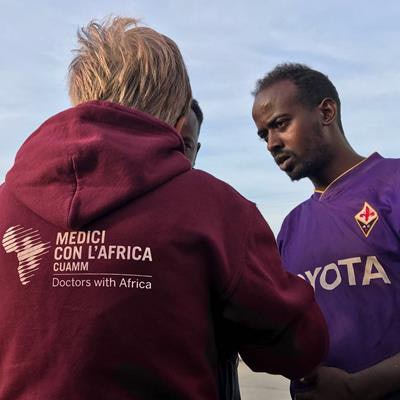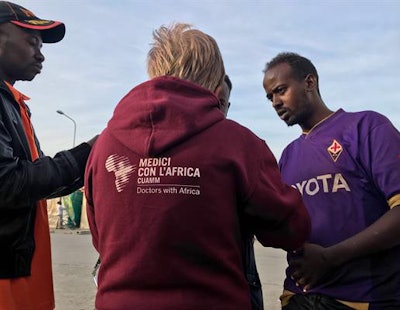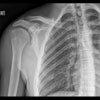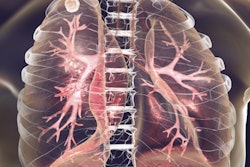
More mobile x-ray units for tuberculosis (TB) screening is a practical solution for migrants in Europe and should be a priority for populations at risk, as long as screening is conducted without stigmatization, according to an expert in healthcare provision for migrant communities.
"If a part of the population can't access healthcare, then the whole of the population suffers," Dr. Davide Mosca, former director for health at the International Organization for Migration, told AuntMinnieEurope.com.
 Staff from Doctors with Africa CUAMM bring medical care directly to a migrant community in Puglia, Italy. All images courtesy of Dr. Claudia Marotta.
Staff from Doctors with Africa CUAMM bring medical care directly to a migrant community in Puglia, Italy. All images courtesy of Dr. Claudia Marotta.He pointed to the rise in cases of TB linked to migration in low-incidence countries and also referred to the growth of vaccine-preventable diseases due to cross-border movement of people from countries with disrupted health services.
Mosca now works as an activist for a migration advocacy network, Realizing Health SDGs (Sustainable Development Goals) for Migrants, Displaced, and Communities, and is an honorary associate professor at the University College of London. He is a co-author of an opinion article, "Stop the exploitation of migrant agricultural workers in Italy," published in BMJ on 27 March.
Outreach strategies
In the article, lead author Dr. Claudia Marotta, from nongovernmental organization Doctors with Africa CUAMM, and colleagues call for medical staff to play a larger role in publicizing the plight of migrant workers in Italy by making it a regular topic at congresses and publishing related articles in scientific journals and mainstream media.
Doctors are closer to the realities of a mobile population and its limited access to healthcare across Italy, the authors noted. Politicians and society at large try to ignore these problems, but medics are well-placed to provide a voice to the voiceless, they claimed.
Currently, Doctors with Africa CUAMM holds mobile outpatient clinics in three of the ghettos in Puglia, Italy, and has provided many services over the past four years, resulting in a total of 4,800 outpatient consultations, with around 60% of these first consultations.
According to the authors, the main reasons for the consultations were fatigue and/or musculoskeletal conditions (46%), dental problems (19%), respiratory symptoms (10%), dermatological symptoms (8%), obstetric/gynecological symptoms (4%), trauma (4%), cardiovascular problems (4%), ophthalmic symptoms (2%), metabolic issues (2%), and psychiatric problems (1%). Almost 80% of the patients required pharmacological treatment, while a complex process was required for the 10% of patients who needed referrals to secondary care.
Despite these efforts, they stress that no clear and definite healthcare pathways are in place to make care fast and efficient.
"We need a cultural shift so that health systems meet the needs of all. At the moment, health services are static and aimed at a homogeneous population," Mosca noted. "Meanwhile, mobile units are only used in emergencies, but they should be a basic part of our equipment to reach the vulnerable," he stated.
Another problem is that the native population, led by biased media reports, tend to blame migrants for "allowing" diseases to spread or injury to happen. He cited a recent case of two babies dying from poorly performed circumcision at home and the resulting anger directed by society at the parents.
"It costs around 2,000 euros for this operation to be performed as it is not provided via the national health service. Migrants often can't afford this and opt for the lower-cost and dangerous alternative, and then only access emergency services when things go wrong," Mosca noted. "But this could be avoided if health services were really people-centered, providing for migrants in society, and if such services could be accessed routinely or even brought to migrant areas."
This rigidity in local services further marginalizes impoverished populations, who are often battling with other issues besides health, such as poor working conditions and housing.
Fierce exploitation
The authors of the BMJ article describe how migrants are set to work by ruthless bosses in the agricultural sector and are paid by the weight of fruit picked rather than per hour, meaning that a wage for an eight-hour day can total as little as 12 euros. The workers are often forced to live in unsanitary ghettos, which the authors estimate number 50 to 70 across Italy, accommodating around 100,000 low-wage migrant workers.
 Living and working conditions are tough for the migrant workers in Italy.
Living and working conditions are tough for the migrant workers in Italy.With no health or accident coverage, many die of cold, hunger, or exhaustion; in fires due to poor housing conditions; or in traffic accidents caused by unroadworthy vehicles used to transport them from home to work, according to the authors. Some are even murdered by the criminal "Caporali," the gang slave masters exploiting these migrant laborers. Over the past six years, the number of workers who have died as a result of their work is more than 1,500, they noted.
Despite these statistics, there is little knowledge and evidence on migration and its related health issues for the workers concerned.
Shared responsibility
"We need to talk and operate in a way that reflects the reality of migration which is a structural fact of our society, yet few doctors seem to be discussing this topic," Mosca noted. "This means being more aware, communicating more, and challenging ministers' perception of reality. Doctors are closer to medical facts than politicians and can lobby effectively."
Marotta echoed Mosca's comments with her own view on how the medical field could better serve migrants. Rather than each discipline such as cardiology or radiology necessarily offering its own specific outreach service, better integration and coordination of healthcare pathways are needed to make secondary interventions such as imaging quick and effective.
Mosca described how antimigration rhetoric and a profound lack of awareness of their appalling work and living conditions hampered migrants' access to healthcare. This leads to even more marginalization of an already vulnerable population, he told AuntMinnieEurope.com.
"It is not an issue of being a radiologist or cardiologist but an issue of being a doctor and caring about the health of people," Marotta said. "The ghettos exist because agricultural workers are fiercely exploited. If they were paid in line with national contracts, they would have other options. Their health is threatened due to their working and living conditions, and doctors should care and advocate for them. Civil responsibility for the agricultural production chain involves everyone."



















